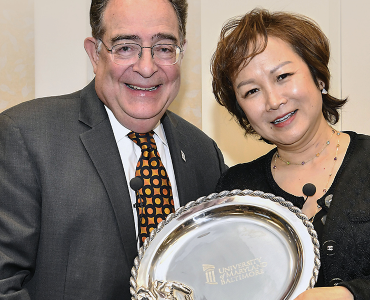
More than 100,000 people in the United States overdosed from opioids in 2021, according to the Centers for Disease Control and Prevention (CDC), and Maryland has seen such deaths double over the past several years. Researchers at the University of Maryland School of Medicine (UMSOM) are taking a unique approach to address the alarming rise in deaths with the founding of the Kahlert Institute for Addiction Medicine, which brings together leading addiction experts in a shared research space to collaborate and create the synergy necessary for systemic change.
“Last year, 20 million Americans were diagnosed with substance use disorder, and only 10 percent received treatment,” said UMSOM Dean Mark T. Gladwin, MD, vice president for medical affairs, University of Maryland, Baltimore (UMB), and the John Z. and Akiko K. Bowers Distinguished Professor, UMSOM. “The Kahlert Institute seeks to build a bridge from the lab bench, where rapid advances in fundamental neuroscience will spur innovative therapies, to the clinic, where lifesaving medications like buprenorphine and methadone require an optimized system to ensure access to any patient in need.”
The institute is funded with a $10 million gift from the Maryland-based Kahlert Foundation, with an additional $10 million provided by UMB and $5 million from UMSOM to renovate research facilities on campus. UMSOM has committed to raise an additional $5 million in philanthropic donations for the Kahlert Institute.
“We need revolutionary progress in the area of addiction treatment and recovery. The Kahlert Foundation recognizes that to achieve radical innovation, you need to bring together the leading experts across multiple disciplines,” said Greg Kahlert, president of the Kahlert Foundation. “Millions of people are affected by addiction in this country, including the child of one of our team members at the Kahlert Foundation. We are hopeful that the Kahlert Institute for Addiction Medicine will discover new treatments that will save countless lives in the future.”
UMSOM faculty will serve as an integral part of the institute. They will include neuroscientists studying the brain mechanisms underlying substance use and its lifelong consequences, and clinical researchers investigating potential interventions in patient trials. Institute members also will include substance use disorder specialists who understand the daily realities of caring for patients with complex disorders often involving psychiatric illness, trauma, and socioeconomic stressors.
Maryland experienced a more than doubling in its rate of drug overdose deaths from 2015 to 2021 — from 21 deaths to 43 deaths per 100,000 people, according to the CDC. In Baltimore City, 964 deaths were attributed to opioid overdose in 2020, nearly triple the number of deaths from homicide.
“There is not a person that I know who hasn’t been impacted by this opioid epidemic. It’s clear we need to do more,” said Kahlert Institute associate director Eric Weintraub, MD, professor of psychiatry and director of the Division of Addiction Research and Treatment at UMSOM. “One critical goal is to establish a collaboration between basic scientists in the field of addiction and clinicians who are treating patients. We need to work closely, put our heads together, and develop strategies for research and treatment that will be effective in the long term.”
Next Generation of Addiction Counselors and Health Providers
Education will serve as a foundational pillar of the Kahlert Institute, with interprofessional training on addiction treatment provided within the University system and to the greater Maryland community. Trainees will include community members and peer counselors as well as health professionals and UMB graduate students entering the medical field. The aim is to educate and increase the next generation of addiction counselors and health providers and create a model that will serve as a national blueprint for community-academic partnerships.
“The University of Maryland, Baltimore is a research powerhouse dedicated to finding solutions to the most pressing problems of today, including addiction. Opioid use disorder and addiction have created a public health crisis in Baltimore, in Maryland, and across the country,” said UMB President Bruce E. Jarrell, MD, FACS. “UMB’s mission — to improve the human condition and serve the public good — means that we have a responsibility to do what we can to address this crisis, and I expect the research we will conduct at the Kahlert Institute will make a powerful difference.”
The Kahlert Institute will create a central hub allowing multidisciplinary investigators to bring together their knowledge and accelerate innovation by sharing the same physical space. It will be located on a currently shelled floor of Health Sciences Research Facility Ill on the UMSOM campus with state-of-the-art labs to accelerate fundamental and translational science, alongside a fully integrated space for clinical care, clinical research, and education.
Fundamental research will focus on developing and testing interventions, including behavioral therapies, drugs, and innovative technologies to reduce cravings, drug use, and the many complications of addiction. Faculty members also will conduct accelerated preclinical research to identify why certain individuals are more susceptible to addiction. Others will explore the cause of the high comorbidity between substance abuse disorders and neuropsychiatric diseases such as depression and schizophrenia. Fetal programming studies investigating how genes are expressed will aim to measure the impact of prenatal exposure to drugs and ways to reduce the long-term consequences.
“Our research techniques include behavioral, neurophysiological, genetic, molecular, and computational approaches. We investigate drugs as diverse as opioids, cocaine, amphetamines, cannabis, nicotine, and alcohol,” said Asaf Keller, PhD, the Donald E. Wilson, MD, MACP Distinguished Professor and chair of the Department of Neurobiology, UMSOM, and associate director of the Kahlert Institute. “This collaboration will help us expand our basic and translational research opportunities by more fully understanding the challenges in the field of addiction medicine to develop new strategies and research approaches.”
Supportive Therapies to Prevent Relapse
Clinical studies will include analyzing innovative treatment strategies to determine, for example, how supportive therapies delivered by peer counselors can prevent relapse. A foundational activity of the Kahlert Institute will be to establish a community advisory board that will include individuals with substance use disorder, community members affected by addiction, and harm reductionists.
“For the Kahlert lnstitute’s scientific, clinical, and educational work to have relevance and impact, it must be grounded in and shaped by the lived experience of individuals with addiction,” said Kahlert Institute associate director Sarah Kattakuzhy, MD, MPH, associate professor in the Division of Clinical Care and Research in the Institute of Human Virology (IHV) at UMSOM. “We want to reduce death and long-term complications of addiction, especially in disproportionately affected communities. Black patients, for example, are far less likely to receive certain medications to treat opioid use disorder than white patients, and we need to find ways to eliminate this disparity.”
Another major goal of the Kahlert Institute focuses on improving the continuum of care for individuals with addiction. Patients with addiction often face additional challenges in accessing traditional health care settings. Experts will focus on creating a more effective care model to address these patients’ primary health care needs and ensure that they have continued access to medication like suboxone or methadone as well as psychiatric services for mental health issues.



